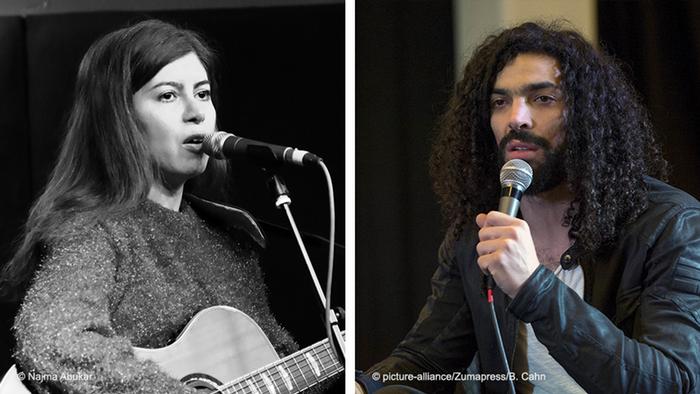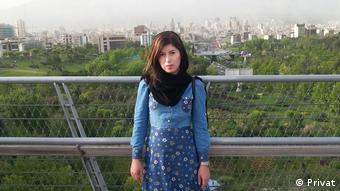The freedom of the music is under attack. Artists such as the Iranian Farzane Zamen and the Egyptians Ramy Essam can’t be swayed. On the world music forum you talk about bans, censorship, and prison.

Ramy Essam (in the title of the picture on the right) has the events of 9. March 2011 processed now, but what happened at that time officers at the time of his arrest by the Egyptian army, has branded him forever in our memory: the blows with clubs and metal bars, the military boots, which were against his naked body and the head, blows the electricity. And he remembers how his torturers called him by his name “Ramy”, and thereby made clear that they knew exactly who he was: The musician, whose song “Irhal” or “Leave” the anthem of the Tahrir square protests was to become of the protests that overthrew the long-time President Hosni Mubarak during the Egyptian Revolution.
For his politically critical music, the Egyptian authorities exercised extremely brutal retaliation to Essam. Since 2014, he lives in exile in Sweden. But he is not silent even now. In 2018, during the Egyptian presidential campaign, published by Essam his Single, “Balaha”. In Arabic, the word “date fruit” means, but in Egypt it is also often used to describe a Person in an unpleasant way. The song criticized the last four years, the government and aimed, before the vote, a debate among the Egyptians to encourage, said Essam in conversation with DW.

Essams Song “Irhal” was inspired by the protest songs in Tahrir square in Cairo. He led him in front of tens of thousands of protesters
After the release of the video, the Egyptian government was the lyricist and Poet Galal El-Behairy as well as the music video Director Shady Habash and the former Social Media Manager, Essam Mustafa, Gamal, to arrest, although the latter two were not involved in the creation of the Songs. All three remain in part because of the accusation, to engage in terrorist, in prison.
For Essam, it was painful to see his artistic staff detained, the torture he had experienced. “You have hurt other people because of something I’ve done,” he said. He launched the “case Balaha”campaign to draw international attention to the, in his opinion, unlawful detention. In a presentation of the planned Panels for freedom of expression on the world music forum (World Forum of Music, WFM) in Paris on 1. October he wants to draw attention to the plight of his colleagues.
Violations of Nigeria to Spain
The right to freedom of opinion and expression, one of the five from the International music Council, established music rights, is increasingly under attack. Limitations of musical expression are still more subject than ten years ago, said the President of the European music Council (European Music Council, EMC), Ian Smith, will moderate the WFM session, the DW.
A study published this year report of the international non-governmental organization Freedom House notes a sharp decline in the General freedom of expression since 2012. Freemuse, an international NGO based in Copenhagen, documented in a recent report on the state of artistic freedom for the 2018 270 cases of Repression in the music, 68 more than in the previous year. “Freedom of expression has always mirrored the political development. The more populists play a role, there is even greater restrictions on freedom of expression,” said Co-Secretary General of EMC Simone Dudt. The Freemuse report also showed that among all the artists the most freedom of expression of musicians is violated.

The Egyptian musician Ramy Essam was awarded in 2019, the human rights award for creative dissidents of the Vaclav Havel Foundation
These violations of freedom of expression are varied, and they occur throughout the world. 2018 Nigeria banned the Hit “This is Nigeria” to the Superstar rapper Falz for alleged vulgarity. Radio stations played it anyway, and were fined. In Kyrgyzstan, the government blocked the music-Streaming service SoundCloud as “extremist”, while Russia, concerts of IC3PEAK after his music video “Death No More”, with scenes cancelled before the political landmark.
In Europe, violations are known: Spain arrested 2018 14 musicians because of “glorification of terrorism” or failure to respect the national symbols. As a limiting case of the freedom of expression of the freemuse Report highlighted the decision of the Ruhr Triennale in 2018, the Band Young Fathers because of the support of a controversial boycott movement against Israel to unload.
The restriction of freedom of musical expression takes place at many levels, said Dudt and Co-Secretary General Ruth Jakobi. “That means not only that you can not occur and is not free to move. It also means that you can get simply no opportunity to perform more.”
From the Iranian underground on the Scottish stage
In such a Situation, Farzane Zamen was in her Iranian homeland, where the Islamic government of solo music prohibits indoor, your music publicly or to publish. Zamen spent the last ten years, especially in order to compose in your room in Tehran, the Songs in private Studios and publish it on Online platforms such as the US-American Radio Javan. When she was asked to privately perform, to sing for a mixed audience, and she always said no. “I felt good, because it could always happen, even in concerts with the officially sanctioned musicians,” she said to the DW.
Also Zamen will speak at WFM Panel. You will travel all the way from Glasgow, where she lives since 2017. Thanks to a scholarship, she came first to Scotland, she stayed as a refugee. Contributed to their decision to apply for asylum, the release of their first album last year. On this deals, among other things, a critical view of the discrimination of women in the Middle East. When she tried to publish the Album on Radio Javan, dismissed the administrators of the website with the justification that it was too political, other administrators in Iran have been imprisoned for the publication of Underground music.

The Cover of Farzane Zamens Album “Z-Bent”
“It was a very sad day for me, because I had to find that the Regime controls the media outside of Iran,” said Zamen. In their Iranian homeland, the Album was not noticed after its publication, still, nevertheless, a increased risk for you. After the Regime was again taken against the protesters and because of the already existing musical constraints decided on the musician to apply for asylum.
Little hope, but the music continues to play
Zamen has no great hope that the Situation will improve for musicians in Iran. “As long as the Islamic Regime is in Power, is the hope of change is equal to Zero. Even below Zero,” she says. Although you would like to be in your home, to be able to be in contact with Iranian music lovers, but she also enjoys the new musical freedom in Scotland. “Here I’m a performing artist, and I’m not really that bad,” she says, laughing quietly. “Honestly!”

In her native Tehran could Farzane Zamen only secretly make music
Essam can’t go back to Egypt. He was also accused of “Balaha”, and he believes that the government used his case to other artists, to intimidate. Nevertheless, he and the imprisoned poet Galal will continue to make music. In brief, you want to publish a song about the Sudanese Pro-democracy movement, and Essam music currently Galal prison poem, “The Tartan Shirt”.
Essam believes that there are in Egypt at the time of real freedom of expression. Art can, however, make precisely this suppression of the subject, he says. The Form could change, “but the essence of the message remains the same. And the people on the street are smart enough to understand the message between the lines and behind the words.”
If you Zamen music of Ramy Essam, and Farzane, as well as other musicians who are persecuted because of their opinions, want to listen to, then go for the DW-culture-created Spotify Playlist, “This is Freedom of Expression.”